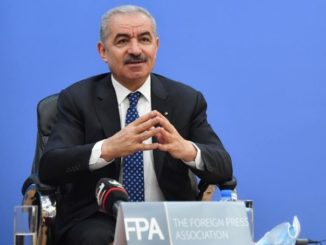
Israel could pay the price for “perpetual occupation and conflict” and face the prospect of being stuck in a “fully-fledged annexation” if it abandons reconciliation with the Palestinians, the German foreign minister has warned.
Speaking in Tel Aviv at the Institute for National Security Studies (INSS), Germany’s top diplomat Sigmar Gabriel said Israel should finally begin to move things forward in the Arab-Israeli peace process or face the grim prospect of unending conflict in a state of “unequal rights.”
Referring to the two-state solution, which embraces the creation of two sovereign states for Jews and Palestinians, Gabriel said Berlin, “as a friend of Israel,” would like to know if the Jewish state “is not supporting a negotiated solution to this conflict anymore.”
Powerful, & all too rare – @BowenBBC brings News at Ten viewers a small taste of life for Palestinians under Israeli military occupation.
Full segment (UK residents): https://t.co/aCl2fYH2cX
Companion video: https://t.co/T3YGgagB8X pic.twitter.com/0kqw7jsZM9— Ben White (@benabyad) February 1, 2018
“I ask those who oppose a Palestinian state: how do you want Israel’s future to look like?” he said, adding: “Are you prepared to pay the price of perpetual occupation and conflict – a price that will continue to grow if there is no hope for self-determination on the Palestinian side?”
Many EU members back the creation of a separate Palestinian state as part of the two-state solution, and there is “clearly growing frustration with Israel’s actions” among the Europeans, Gabriel said.
In Germany itself, young people feel “increasingly less inclined to accept what they deem an unfair treatment of the Palestinians,” the diplomat added.
Israel is now facing two prospects – it either bears “the consequences of fully fledged annexation, a one-state reality of unequal rights” or it accepts “a single democratic state between the sea and the river.”
#Video The child martyr laith Abu Naiem 16 years old who was shot in the head by Israeli occupation forces in Al Mghayyer village near #Ramallah . pic.twitter.com/hUP0AG4RfX
— Days of Palestine (@DaysofPalestine) January 31, 2018
Over the past decades, there have been a number of attempts to broker an Arab-Israeli peace solution, but none have succeeded. Israel is seemingly turning a blind eye to the expansion of Jewish settlements in the annexed West Bank, and is tightening its grip over the Gaza Strip and the rest of Jerusalem.
Germany is worried “by the lack of convincing answers” to questions emanating from the stalled peace process, Gabriel noted, before offering some “good news.”
Berlin “is looking forward to the day when it will be able to move its embassy in Israel to Jerusalem,” the foreign minister said, then offering an explanation: “But let me add: in two states with Jerusalem as their capital.”
The status of Jerusalem is another stumbling block to making lasting peace between Israelis and Palestinians. Initially thought to become a city enjoying special international status under an UN mandate, it was occupied and later illegally proclaimed the capital by the Israelis following the 1967 Six-Day War.
The greatest free speech threat in the West — attempts to outlaw activism against Israeli occupation — may have just suffered a fatal blow. https://t.co/ivIMZVcqj3
— The Intercept (@theintercept) January 31, 2018
Most Western countries do not formally recognize Jerusalem as Israel’s capital. However, in December last year, US President Donald Trump announced Washington will “acknowledge the obvious” and regard Jerusalem as the capital of Israel.
In a statement, Trump left the door open for possible talks, saying: “The United States would support a two-state solution if agreed to by both sides.”
(RT, PC, Social Media)







